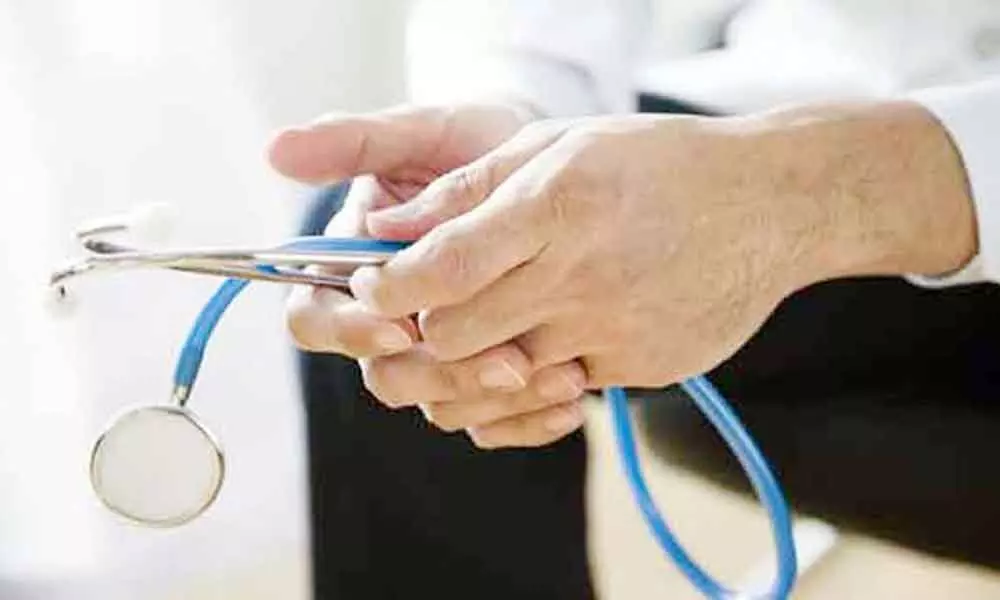Live
- MPs, MLAs in Odisha have become redundant: Nadda
- 'Preminchoddu' - Film Unit In Teaser gets grand Launch
- Mumbai hoarding crash: Billboard owner Bhavesh Bhinde nabbed from Udaipur
- Cloud software major Zoho to pump millions of dollars into chip design in India
- National Endangered Species Day 2024: Date, History, Significance, and Key Facts
- IPL 2024: Some failures teach you more, says MI youngster Naman Dhir ahead of LSG clash
- World Telecommunication Day 2024: Date, History, and Significance
- Swati Maliwal’s statement recorded in alleged assault case: Police sources
- Kejriwal & Mann pay obeisance at Golden Temple, Durgiana Mandir
- Manika, Sharath to lead India's six-member TT squad at Paris Olympics
Just In
Junior doctors, nurses face litmus test


Junior doctors, nurses face litmus test
Amid the coronavirus pandemic across the country, junior doctors and nurses have faced harrowing experiences coupled with a litmus test on a frequent basis while on duty
New Delhi: Amid the coronavirus pandemic across the country, junior doctors and nurses have faced harrowing experiences coupled with a litmus test on a frequent basis while on duty.
A 27-year-old junior doctor Vinod Chauhan, who began his career recently, recalls a harrowing incident during the Covid-19 pandemic, and said, "On the very first day of my joining, a Covid-infected woman died whom I could not save. I have not forgotten the name of that patient till date.
I had never thought of experiencing such an incident on the very first day." Chauhan had completed his MBBS from abroad in 2018 and returned to India to practise medicine. During the Covid-19 pandemic last year, his first duty as a qualified doctor in December 2020 was in the Covid ward of Delhi's AIIMS Hospital.
During the second wave of Covid-19 infection, a friend of Vinod Chauhan asked for help in arranging medicines for his family, but he could not manage it despite all efforts, following which he had strained ties with his friend.
Vinod is not the only resident doctor who has undergone this kind of experience during the corona pandemic. A total of 550 doctors mainly young have died in the second wave across the country. However, there were some doctors who were working as interns in hospitals. The 26-year-old Samar Ajmat, who works in the emergency ward of LNJP Hospital at New Delhi, joined the hospital in January this year and while treating Covid-19 patients also contracted the virus during the second wave.
Sharing her experience with IANS, Samar said, "When I joined the hospital in January 2021, the situation was normal at that time, but after a few months the situation changed completely. During the second wave of the pandemic, more critical patients came as compared to the first wave. Every patient had lower oxygen levels."
"While treating several Covid-19 patients, I got infected on April 27 and recovered after 15 days and joined the hospital again. As fellow doctors were constantly getting infected, the doctors looking after patients were fewer in number."
Meghna (name changed), Nursing Officer working at Delhi's RML Hospital, told IANS, "I have a three-year-old son who used to play with me. During the second wave it became so difficult that even touching my own child instilled fear in me." "Due to the lockdown there was no mode of transport available to visit the hospital. I used to leave my house at 6 a.m. from Faridabad and returned home at 6 p.m."
Nurse Meghna's friend Shaurya (name changed) recalls, "During the second wave there was a major shortage of beds. Many of our family members urgently required beds in the hospital but even after working in the hospital we could not help them." "People feel as we are working in the hospital, facilities like beds are easily available to us. This is a wrong conception as we, too, have to struggle like common man."

© 2024 Hyderabad Media House Limited/The Hans India. All rights reserved. Powered by hocalwire.com






